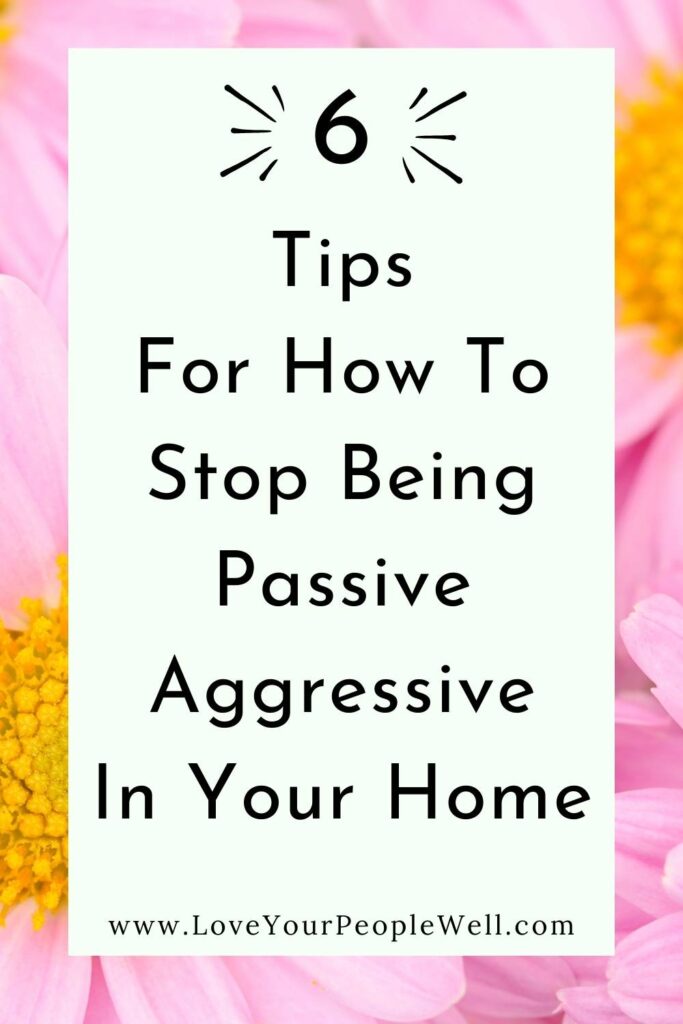Trying to stop being passive aggressive with your husband and kids? Try these tips and find more connection in your family communication.
Yes, you can stop being passive aggressive!
Sometimes, all you need is HOPE.
Communication is a big part of family life. It’s a centerpiece of feeling connected to your husband and feeling successful with your kids.
And while it is true that bad habits can be hard to break… and it’s true that big emotions can be hard to manage… you can definitely stop being passive aggressive!
There is hope, friend. These 6 tips might take some practice, but they’ll get you to the other side.
[This post may contain affiliate links. If a purchase is made, I may receive a small commission at no extra charge to you.]
What is passive aggressive communication?
There are a lot of ways that communication can break down in our Christian families. And one of the toughest ones is when people start acting passive aggressive with each other.
It’s dishonest, and it erases intimacy and connection in your home!
Passive aggressive behavior is when someone is acting or speaking out of a place of hurt, frustration, or anger, but they are doing it indirectly. Instead of talking about it, they might be sarcastic or do things knowing that they will upset or annoy the other person.
That is definitely not what you want for your Christian family relationships. So let’s change it!
RELATED: Examples Of Passive Aggressive Communication In Family Life
Why do we start using passive aggressive communication?
There are many reasons that you might find yourself speaking or acting in a passive aggressive way.
In fact, sometimes you might do it accidentally! Frustration and anger can sometimes bubble up inside us and peak out through our actions or tone of voice.
In my experience as a marriage and family therapist, there are 3 big reasons why people fall into passive aggressive communication patterns. You might struggle with one, two, or all three of these!
- If you feel uncomfortable with your emotions, or with talking about your emotions. Anger, embarrassment, frustration – these can be hard to deal with and awkward to talk about!
- You might have trouble with people-pleasing or be trying to avoid conflict at all costs… instead of dealing with real issues that come up.
- If you’re worried about how the other person would respond to your emotions or your honesty, it will be hard to be open and honest in your conversations.
RELATED: Keep Your Cool, Mama! Get help with my 40-Day devotional on emotional control
How to stop being passive aggressive
When you stop being passive aggressive, you can start communicating honestly with your family. This is usually called assertive communication.
Speaking assertively means that you are expressing your thoughts, feelings, and perspectives – WITHOUT yelling, demanding, speaking unkindly, or being overly blunt. But you’re also not shutting down, giving in, and pretending that your feelings don’t matter.
Your feelings definitely matter!
And so do your husband’s feelings. Your kids’ feelings. And the overall atmosphere of your home.
So, try these 6 steps to help you stop being passive aggressive in your home,
(1) Notice your feelings… and then pause.
Instead of reacting to your emotions, pause. Take control. The sooner you notice a hard emotion (anger, embarrassment, fear, or others) the sooner you can deal with it.
Emotions can quickly take over what you’re saying or doing. Take charge by noticing, pausing, and deciding how to move forward.
(2) Practice using emotion words.
Label your feelings – even if that’s only between you and God for now! Put words to your emotions and practice saying that out loud. This will move you toward healthy communication with your family and others.
You might start with prayer, journaling, talking to a friend, or even just standing in front of the mirror.
(3) Rehearse what you want to say.
Stand in front of the mirror and practice what you need to say. You cannot control how other people respond to you, but you can choose your words and practice staying calm, kind, and under control. This will help you be assertive instead of passive OR aggressive.
NEED HELP WITH BIG EMOTIONS? Grab my 40-day devotional on emotional control.
(4) Notice and spotlight what is good.
The more that you focus on things you are thankful for, things that are going well and that make you happy, the less energy you will spend on these painful emotions. You don’t want to pretend they aren’t there, but you also don’t want to pretend that the good stuff isn’t there either!
Notice the good, talk about it, compliment people, and see how your perspective changes.
(5) Pray, apologize, and try again.
We all mess up sometimes. Even when you are trying to stop being passive aggressive, it will be a struggle. Ask God to help you.
And when you do mess up, go back to apologize and then try the conversation again. Sure, this is awkward! But it also can make a big impact on what you do next time.
(6) Work on your controlling your big emotions.
Anger is a very normal emotion, and it is not a sin. The way we speak and behave when we are angry is usually the real problem!
Identify some ways to handle your anger, and then practice that. Try slow, deep breathing every day, even if you don’t feel angry right then. Find ways to exercise and release energy when you are angry. Use art or music to help move your emotions back to a more peaceful state.
With God’s help, you can stop being passive aggressive
Bad habits are hard to break, but anything is possible with Jesus. God has a lot to say in the Bible about how we communicate with each other, and He loves to help us restore and redeem our relationships.
Pray for your marriage. Pray for your kids. Pray for yourself! Seek God’s help, make genuine effort to try to stop being passive aggressive, and pay attention to how God starts working through those prayers.
Listen to Episode #129
Let's connect!
- JOIN MY EMAIL LIST for weekly tips, gospel encouragement, and a new coupon code each month.
- JOIN THE FAITH FIVER CLUB in our Patreon community, to support the ministry and get exclusive access to our private podcast, Q&As, and more.
- JOIN ME ON PINTEREST and on Facebook and Instagram too, for regular encouragement and fun.
And as they say... sharing is caring!
Disclaimers: I am a licensed therapist but my podcast, blog, and resources are not professional or personal advice. I am an affiliate for many of the resources that I link to, and may earn a small commission if you purchase through my link. Read my full disclaimer here.



